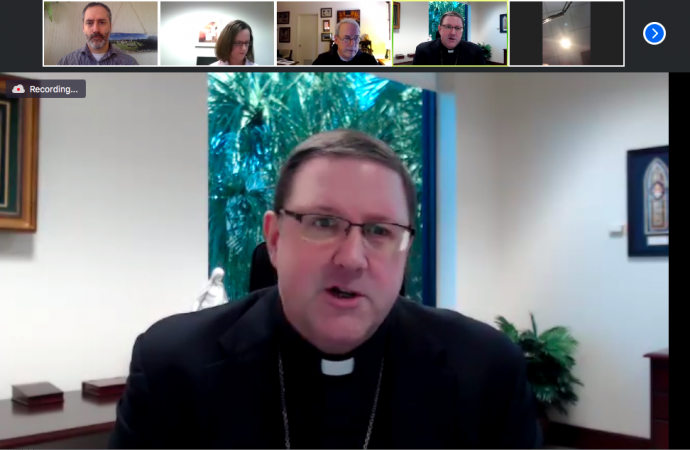
By Christopher White, National Correspondent
NEW YORK – Catholics and Protestants marked the fifth anniversary of Pope Francis’s environmental encyclical, Laudato si’, with a message that although coronavirus is not directly linked to climate change, for people of faith, the key to overcoming both challenges lies in prioritizing the common good.
On Wednesday, Bishop Gregory Parkes of the Diocese of St. Petersburg convened an online dialogue between Catholic and evangelical leaders in Central Florida on pro-life responses to coronavirus, other current and future disease outbreaks, and climate change, where he told attendees that “we’re not just individuals in this, but we’re united in the effects.”
Parkes cited the pope’s 2015 pastoral letter where he says that the majority of the people on planet earth are people of faith and they should dialogue together for the sake of protecting nature. In that spirit, he said, both the coronavirus and climate change require people of faith to be united, more compassionate and more charitable.
Sabrina Burton Schultz, the director of Life, Justice and Advocacy Ministry in the diocese of St. Petersburg echoed Parkes’ remarks referencing a recent Ipsos poll that found that 60 percent of Americans believe that climate change will be as serious a threat as COVID-19.
In particular, she noted that air pollution exacerbates respiratory illnesses and also leads to dramatically higher death rates of Covid-19, noting that this is an area in which faith leaders can work together in the short and long term.
Dr. Sandra Gompf, an associate professor of infectious disease at the University of South Florida College of Medicine in Tampa, cited a range of statistics to evidence increased ecological devastation, from rising temperatures which changes the habitat for insects that are vectors of human diseases to increased disruption of weather patterns yielding more hurricanes. She warned that these are not just issues that other countries are dealing with but rather issues close to home that are ignored at our own peril.
The Reverend Mitchell Hescox, president and CEO of Evangelical Environmental Network, reminded attendees that “creation care is a matter of life.”
“Everything that we put into God’s creation that isn’t supposed to be there,” said Hescox, “comes back and impacts human life.”
Nearly 200,000 people die each year of air pollution from fossil fuels, he said, adding that warming temperatures and more smog means that “things are getting worse and not better and we need to act now to overcome that.”
Even so, Hescox said, “we are not hopeless or helpless,” noting that he’s been encouraged to see many Catholics install solar panels for their ministries.
“It’s not only a great way to save money,” he said, “but is a great way to clean up the air,” also encouraging every diocese in the country to promote community gardening.
Dr. Joel Hunter, a retired Senior Pastor of Northland Church and a founding member of the Evangelical Climate Initiative, said that the current coronavirus is a sobering reminder of the challenges faced today when one is forced to consider “what happens when your own breath becomes an infectious source of pollution.”
Both the immediate pandemic and the larger climate crisis, he warned, is a “problem too big for any one faith group to address.”
Despite being an evangelical, Hunter said that Pope Francis has been a premier voice of solidarity and cooperation,” adding that the “the social doctrine of the Catholic Church is absolutely wonderful theologically,” and helps all people of faith cooperate in fulfilling God’s original mandate of caring for creation.
Similarly, Father George Corrigan, pastor of Sacred Heart Catholic Church in Tampa, told attendees that Catholic social teaching helps achieve an equilibrium between the human person and the community around them.
Corrigan said that if you look back on recent plagues, be it the Yellow Fever epidemic in Tampa, the Spanish Flu, or Covid-19, none of them had an immediate vaccine.
“The only vaccine, or antibody, was solidarity,” he said, noting that’s what people of faith should remember today.
He urged attendees to consider this – be it crowds on Florida’s beaches during spring break, or protestors upset about wearing a mask – saying, “What we do affects human flourishing at every level.”
“As we make those choices, are we truly seeing what affects the common good?” Corrigan asked.
